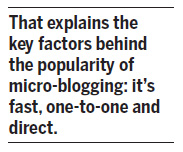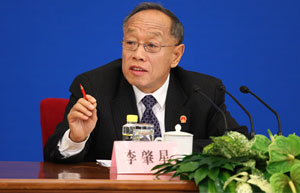How IT is opening doors everywhere
By Wu Jiao (China Daily)
Updated: 2011-03-10 08:50
Two of my colleagues are fresh hands at covering the two sessions, which means that for them being around thousands of NPC delegates and CPPCC National Committee members is like being lost in a sea of strangers.
But my colleagues have managed to figure out who is who - with the help of an iPad.
| ||||
More than that, search engines will also tell you whether this delegate is in charge of a government body or from the grassroots, and what possible scoop he or she will give you, as there are plenty of previous reports to read.
Thanks to the iPad, which is more convenient than a laptop, my colleagues are no longer confused and can happily chase news stories among the thousands of participants.
As well as the iPad, another new IT development has been a feature of these sessions: the micro blog.
This new communication channel has had a huge impact on many Chinese during the past year, with just a picture or a few sentences quickly turning a small incident into a national event or a humble person into a celebrity.
In one instance, a Beiijng scholar launched a micro-blogging campaign in which he called on netizens to send pictures of begging children who might have been trafficked to his micro blog so parents could search for their lost children.
Within days, the micro blog had mobilized tens of thousands of netizens and helped at least one child return to his family.
Participants at the two sessions have been fully aware of the far-reaching and real-time features of micro-blogging. They also see clearly how they can use this platform to solicit ideas from the public.
Many of the NPC delegates and CPPCC National Committee members put the motions and proposals they are going to submit on micro blogs for public discussion.
Zhang Xiong, an NPC delegate, has received so many messages from netizens on his micro blog that he has had to ask them to concentrate on public issues rather than individual cases.
What's more, friends of mine who are experienced web users have explained to me why so many people read micro blogs.
"I don't know these people in person, but sometimes it's pleasing to find that great minds think alike when I read important people's proposals and motions," said one friend, who works for an IT company and is a passionate follower of well-known micro-bloggers.
"When I don't agree with them, I will make my point. It's exciting to get feedback within minutes," he said.
That explains the key factors behind the popularity of micro-blogging: it's fast, one-to-one and direct.
Micro-blogging might be new, but cyber opinions played a role in Chinese politics before micro-blogging came along.
Chinese leaders have long been aware of how cyber opinions matter.
President Hu Jintao and Premier Wen Jiabao have chatted on the Internet with netizens several times over the past three years.
And Jia Qinglin, China's top political adviser, announced last week that soliciting public opinions from the cyber world is on top of the CPPCC National Committee's agenda for this year.
That decision has cheered micro-blogging fans like my friend.
"I always think that I am not just writing for myself. Actually I represent the group of people like me. Getting our voice heard gives me the sense of being involved," my friend said.







